I Dig Sports
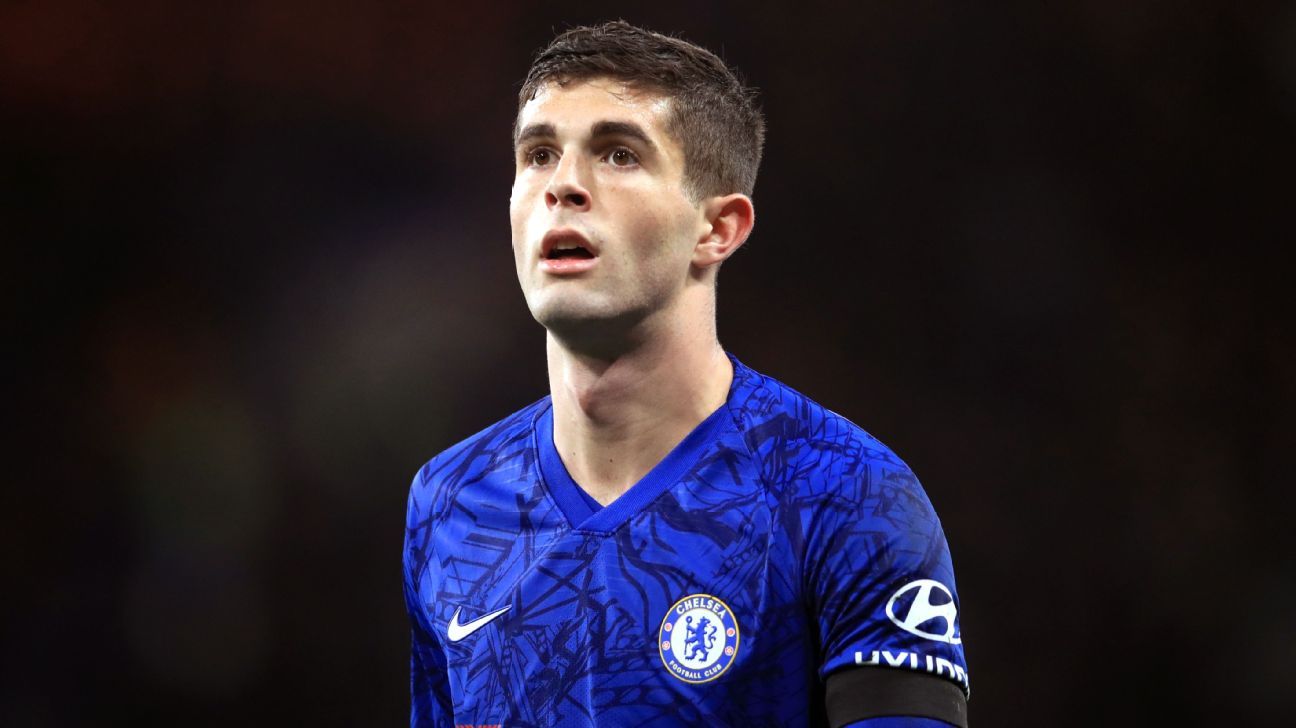
Chelsea manager Frank Lampard has said United States international Christian Pulisic is training with the club's under-23s ahead of his return to the first team.
Pulisic suffered an adductor injury in training in January and had a further setback in early February.
Lampard said the 21-year-old would not be able to play in Chelsea's Premier League clash against Manchester United on Monday.
"Christian trained with the U23s today, so won't be fit," Lampard told a news conference in Friday.
"Ruben [Loftus-Cheek] won't be fit for this game. Tammy [Abraham] is still feeling the effects, to be honest. He trained today, but is to be assessed."
Pulisic last played on Jan. 1 in the 1-1 draw against Brighton.
Lampard also commented on Ajax forward Hakim Ziyech, who like Pulisic plays on the left wing and will join Chelsea at the end of the season in a deal that could cost up to €44 million.
- Transfer Grades: All the big moves rated
- When does the transfer window re-open?
- All major completed transfer deals
"He has the ability to make assists and score goals," Lampard said. "We have had a lot of the ball, but not the final ball. Hopefully he can bring that next season.
"He will have to fit in the way we want to play here, but the quality will hopefully be there to see. I had been watching him a lot. I was impressed against him at Tottenham last season.
"We want to bring in good people and he ticks a lot of boxes. I'm delighted."
Lampard also said the Morocco international's arrival did not guarantee the exits of Willian and Pedro, with whom "conversations are ongoing."
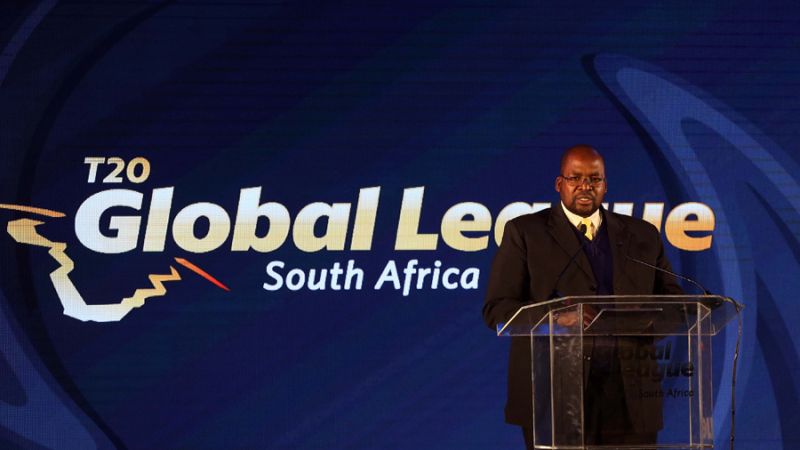
Chris Nenzani will remain CSA president following Wednesday's board meeting, where a decision regarding his future could not be taken because it was not tabled on the agenda.
The motion to discuss whether Nenzani should be voted out is understood to be driven by the Central Gauteng Lions franchise and has the support of at least two other unions - KwaZulu-Natal and the Western Cape. However, CSA's Memorandum of Incorporation (MOI) is silent on whether a franchise has the procedural right to propose a motion, or if the motion must come from one of 14 provincial members.
ESPNcricinfo has learnt that the interpretation of the MOI will be considered in the coming weeks, which may yet lead to a motion to remove Nenzani. The process could take several weeks.
Until then, he will remain in office despite repeated calls for him to step down from stakeholders including the South African Cricketers Association.
Nenzani was elected CSA president in 2013 and served two three-year terms before successfully lobbying to have the CSA constitution changed in order to extend his term for another year. He is due to remain in office until September.
Redskins releasing CB Norman after 4 seasons
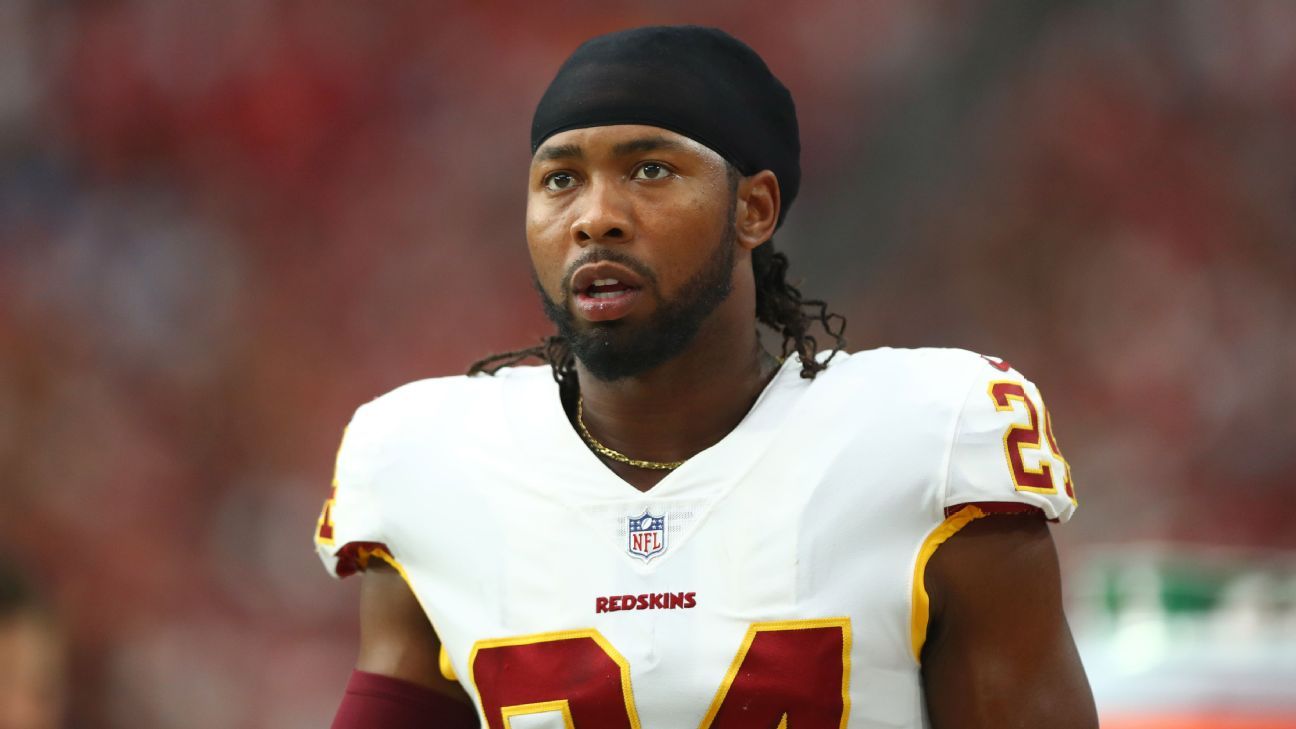
ASHBURN, Va. -- The Washington Redskins are releasing cornerback Josh Norman, he told NBC Sports Washington on Friday.
"It's their choice, not mine," Norman said. "Now I can start something new and fresh."
Norman said new Redskins coach Ron Rivera, who coached the cornerback in Carolina, called him Friday morning to inform him of the release.
The move will save the Redskins $12.43 million in cap space, money that could be used in part to sign another cornerback. The move was widely expected, even though the Redskins hired Rivera after the season. Norman's best work came in Carolina, where he was named a first-team All-Pro after the 2015 season.
That honor coincided with Norman's first venture into free agency. After Carolina rescinded the franchise tag it had placed on Norman, he quickly signed a five-year deal with Washington worth up to $75 million, making him the NFL's highest-paid cornerback.
Norman intercepted seven passes and forced eight fumbles in his four seasons but didn't provide more game-changing plays as he did in his final season with the Panthers. That season, he intercepted four passes, returning two for touchdowns, and forced three fumbles as Carolina reached the Super Bowl.
He often was on the wrong end of some long receptions with the Redskins, though there were times when he anticipated safety help that didn't come. He also was asked to play different styles than what made him successful in Carolina, where he played a lot of cover-2 zone.
The Redskins benched Norman late last season. He played in only two games, covering 10 snaps, over the final six games. In another game, his only work was two special-teams snaps. Even as the Redskins needed to sign other cornerbacks off the street, they held firm to not playing Norman.
Washington also has a decision to make on starting cornerback Quinton Dunbar, who is seeking a new contract. A source close to Dunbar said he wants to be traded or released if he doesn't get a new deal and that he won't negotiate after training camp begins.
Dunbar, who has missed a combined 14 games the past two years because of injuries, has a base salary of $3.25 million this season, none of which is guaranteed. He was set to meet with Rivera about his situation.
A football coach's grief and hope two years after Parkland
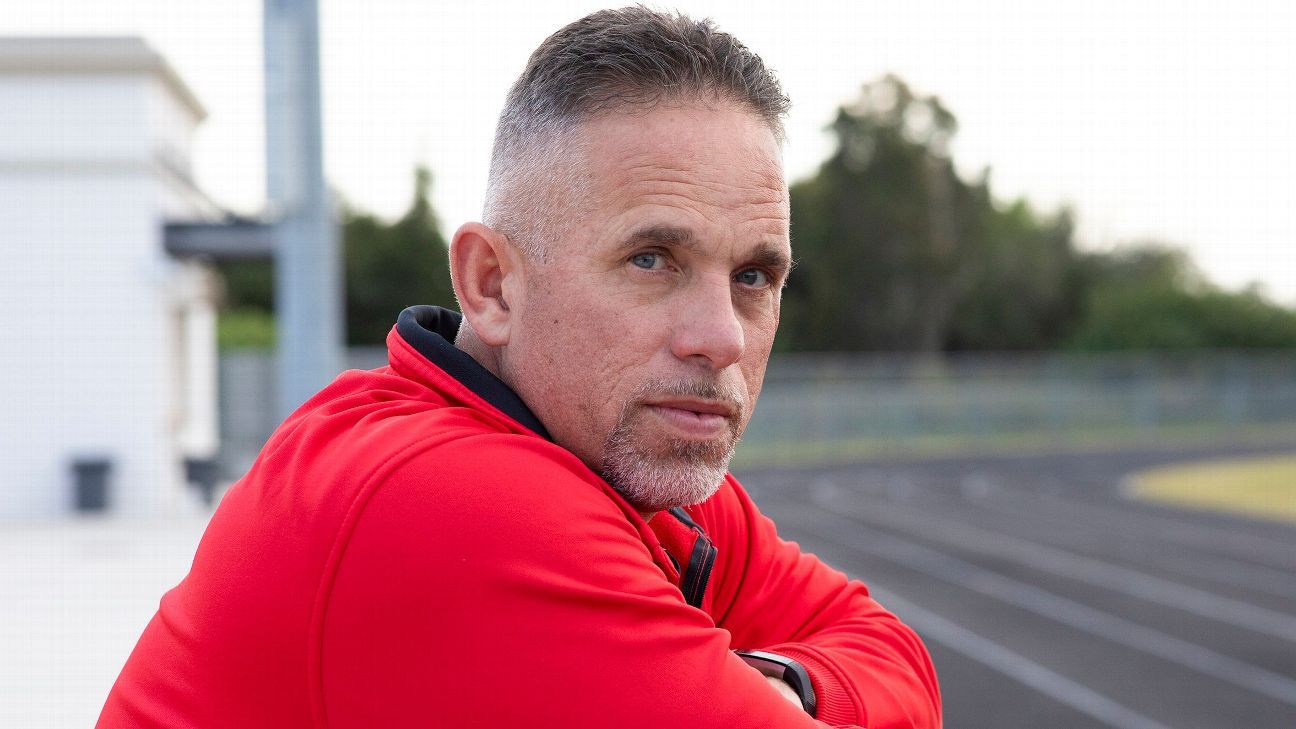
FORT MYERS, FLA. -- Willis May keeps reminders everywhere. A framed team photo sits behind his desk. So does a white mini helmet with an Eagles logo and the number 17 in the center, encased in a plastic cover. Resting on top, a black wristband with bold white letters spelling "Coach Feis." In his phone, a final text message to his best friend, asking, "Where's the shooter?"
There are more subtle reminders of the day at Marjory Stoneman Douglas High School that changed everything. The sound of balloons popping startles him. His new athletic director will not let anyone rattle May's doorknob or approach his office during lockdown drills. His mom asks him all the time, "Are you sleeping better?"
Willis May tells her he is, but he doesn't tell her much more. What he wants to say to her is finding peace is impossible. That he is racked with guilt. That he feels like he let his best friends and innocent students down. That yes, he is sleeping and yes, he is happier, but no, he will never be completely better.
At least, that is how he feels today, two years after a mass shooting at Stoneman Douglas left 17 people dead, including his two best friends -- assistant coach Aaron Feis and athletic director and wrestling coach Chris Hixon. May, the Stoneman Douglas head football coach at the time, put his own grief aside to coach his devastated players through the 2018 season.
Every day of the new school year, every football game under the Friday night lights, felt more exhausting than the next. May pushed forward because he needed his players to think everything would be OK, even though he felt the opposite. When the season ended, his own anguish reached such an agonizing level, May could think about only one thing: leaving.
So he did. Last spring, May made the heart-wrenching decision to leave Parkland, Florida, and move west across I-75 to coach at South Fort Myers High School. When he arrived, he found a program and players who needed him just as much as he needed them.
The move has allowed him to stop thinking, every single day, about the horrors of Feb. 14, 2018. But on the other hand, it has been impossible to completely block out that day and how it changed what it means to be Willis May, to be a resident of Parkland, to be a student or teacher or parent or administrator at Marjory Stoneman Douglas High School.
May wants to coach football, the way he has for more than 20 years, but he is now a mass shooting survivor, and with that comes complex, dueling emotions that are hard to accept, let alone understand. He needs to move forward, but moving forward feels selfish because 17 others cannot. He wants to turn South Fort Myers into a state champion, but he needs his experience coaching Stoneman Douglas to help. His new life does not exist without his old life, so he forces himself to remember when there are days he would rather forget.
Says May: "How do you get over it?"
THE SUN STARTS to set on a muggy October day in Florida. Gary May waits on the football field for his brother, with bags of red, white, silver and black spray paint cans on the back of a golf cart. He already has laid down the Wolfpack logo stencil at midfield. They need to paint the field, the same way they did at Stoneman Douglas.
Willis May emerges from his office inside the school building, tells Gary where to start, then grabs red paint and begins to go over the yard marks. South Fort Myers has a big game the next night against rival North Fort Myers, and the May brothers stay out here for four hours making sure the field looks perfect.
At South Fort Myers, Willis May inherited a proud, young football program. The school counts Kansas City Chiefs receiver Sammy Watkins and Minnesota Vikings safety Jayron Kearse among its football alumni. This program knows how to win. But when May arrived, he said, the program was in disarray. The locker room and weight room were a mess. Players had quit on their coach and one another during a 1-9 season in 2018, and the hostility among them had seeped into everything they did. Classmates and teachers made fun of them to their faces. May's job was to tear it down and build it back up, to rebuild and restore.
As he explains what he found here, it's clear he's not just talking about his program.
May never sought help after the shootings. He has not spoken with a therapist. He rarely shares what happened. His wife, Melissa, tells him he has survivor's guilt. He agrees he probably does.
Sarah Lowe, an assistant professor of social and behavioral sciences at the Yale School of Public Health, co-authored a study in 2017 that examined the mental health consequences of mass shootings. The study found post-traumatic stress symptoms, major depression and other psychiatric disorders among the most common outcomes for survivors. While the studies she found on school shootings focused mainly on student survivors, only a handful detailed the impact on teachers and staff.
"We don't necessary think of the adults and their losses and suffering," Lowe says. "The adults affected by the trauma have by default the responsibility of helping their students heal. It can be hard to be there for other people when you're suffering yourself."
The thing is, May, 52, has never been someone to share his feelings. Rather than speak, he acts. He fixes. He makes things around him better, and that makes him feel better. At Stoneman Douglas, he couldn't make anything better anymore. But he can here, at South Fort Myers.
So he remodeled the weight room and locker room, painted walls with his mother, put up Wolfpack decals, tore down old cabinets and bought new carpet, spending some of his own money to get it done.
The idea to paint a wolf at midfield also came from May. He brought his booster club president from Stoneman Douglas to help raise money for new clothes, gear and more. They bought an inflatable tunnel with a giant wolf at its mouth for players to run through and onto the field. His parents helped make an "Alpha Wolf" -- a statue of a howling wolf on a painted base they placed next to the end zone for players to rub as they exited the tunnel.
"He put a new pair of shoes on this school, and when you put a new pair of shoes on any kid's life, they're going to feel like they're 7 feet tall," South Fort Myers athletic director Chris Harris says. "These kids' confidence just boosted up."
To May, players are players, no matter who they are or where they grow up. Therefore, he wanted his South Fort Myers players to have everything his Stoneman Douglas players had. Mind you, the two schools could not be further apart in location or student population.
Stoneman Douglas benefits from being in Parkland, where median household income is $107,000. The Florida Department of Education has rated Stoneman Douglas a School of Excellence for three consecutive years.
South Fort Myers is a Title I school with a high concentration of students from low socioeconomic backgrounds. It is located in Lee County, where students have the ability to choose the school they want to attend. South Fort Myers offers vocational training in areas like plumbing, welding and automotive to help attract students interested in those fields.
Coaching transcends so many of these differences, serving to unify players toward one common goal. May changed nothing about his approach at his new school. He emphasized discipline, accountability and responsibility. Miss three practices without prior approval, and you're no longer on the team. Weight room sessions became daily competitions, and players saw jaw-dropping gains, many improving their squats and lifts by more than 100 pounds in just eight weeks.
He introduced 40x40s: 40-yard sprints, 40 times, every Monday. The first time they did them, it took the entire practice to complete.
"What he was offering was better than what we just went through," offensive lineman Jake Bond says. "You have to buy in 100 percent. The intensity was on another level. We all worked so hard over the summer, there was no way we were going to go 1-9 again. It wasn't possible with how hard we worked."
By mid-October, the Wolfpack were 6-1 with rising playoff hopes. His new team had come so far in six months. Football began to mean something again to his players, his school and his community. They had support. Fans showed up. Faculty showed up. His players believed in him, but more than that, they started to believe in themselves.
Surely, he is happy now. So you ask: Are you happy now?
May pauses. He has no idea what to say.
MAY GREW UP in Logan, West Virginia, and spent 19 years at Hurricane High in Hurricane, West Virginia, including eight as head coach, taking one team after another to the playoffs. He had just gotten the program a new turf field in 2011, expecting to finish his career there and retire.
But his wife got a job offer in South Florida that would greatly increase her pay and responsibility. They hated to move, but believed it was in their best interest. So the Mays and their three sons left for Florida, not quite knowing what to expect. May interviewed at a few high schools in the Fort Lauderdale area, but someone told him he ought to check out Stoneman Douglas because its coach was from West Virginia, too.
May liked the school. He believed it was safe and the best fit for his family. He signed on to be an assistant for the 2012 season, and his middle son earned a spot on the football team. But after the season, then-Stoneman Douglas athletic director Mitch Kaufman replaced coach Rick DiVita with May.
That was how and why a self-described country boy from West Virginia found himself locked in his office in Parkland six years later. May had helped stabilize the football program, going 28-21, but there was still work to do to chase down an elusive playoff spot. He thought they were getting closer. Plus, he was happy. Two of his sons were coaching with him.
His brother Gary would drive from his home in Fort Myers on Thursdays to help him paint the field for home games. His parents would drive from Fort Myers on Fridays for every game. May preached family to every team he coached. Stoneman Douglas was family now. Stoneman Douglas was home. He never wanted to leave.
May was hosting college recruiters on Feb. 14 when a former student walked onto the Stoneman Douglas campus with a semi-automatic rifle and opened fire. May heard someone mention the sound of firecrackers on his walkie-talkie before the school went on lockdown. May locked everyone inside his office and sent a text message to Feis, a school security guard, assistant football coach and his best friend.
Feeling restless and helpless, May left the office to check the closest hallway. He heard faraway shots. Then the SWAT team told him to get down. Shortly after, as the school was being evacuated, one of his players ran up to him.
"Coach Feis is dead!"
May refused to believe it. He walked off the school grounds and stood at a gate along the perimeter. He saw a sheriff's officer who was the father of another player. May said, "Tell me the truth. Is Aaron dead?"
"Yes."
Feis was the first person May met at Stoneman Douglas, and they formed a tight bond. Every morning, Feis would give May a ride on his golf cart from the parking lot to their office on the other side of campus. Their desks were next to each other. Chances are if you spotted May on the football field, Feis was not far away.
In the weeks and months that passed, nothing felt normal, no matter how much May wanted them to be normal. He lived in suspended reality. One night, he saw the door to Hixon's office open and thought for a brief moment that his old friend was about to walk out the door to tell him something.
It was the janitor.
May had to remind himself all over again that his friends were gone.
You start to question your sanity in these moments, maybe more than the hows and the whys and the unfairness of it all. Yet as hard as it was for May to grapple with the tragedy and loss, he knew it was far harder for his young players. May vowed to keep his players together, no matter the cost to his own health.
As the new school year rolled around, the shooting became such a divisive issue, lines were drawn and no one could talk freely about how they felt. The Marjory Stoneman Douglas High School Public Safety Commission was set up. Investigations were launched. Lawsuits were filed. Douglas was under a microscope, and nobody knew who was in charge. By November, three assistant principals and a security specialist were reassigned, and Broward County Sherriff's deputy and school resource officer Scot Peterson resigned amid furor that he did nothing to mitigate the attack. (He was later charged with 11 counts of felony neglect of a child, culpable negligence and perjury. He has pleaded not guilty. The case is pending.).
The incoming freshmen could not possibly conceive what their older classmates had been through, and the callousness among some devastated others.
A book thudding to the ground set off waves of panic. May saw this post-traumatic stress reaction in his players earlier in the spring, when he took them on a visit to Florida Atlantic football practice. The pop of a nail gun from a construction worker in the football facility lobby sent them crouching to the floor, looking for cover.
A woman standing near them turned to May with a puzzled look on her face.
"We're from Marjory Stoneman Douglas," he said.
She started bawling.
No matter how the students at Stoneman Douglas dealt with the tragedy individually, May wanted them to have something to collectively cheer -- their football team. May and his players dedicated their season to the 17 people who died, putting the number inside the Eagles logo on their helmets. He made an acronym out of Feis: "Fearless, Emotion, Intensity and Sacrifice."
Every day at practice, May reminded his players they were strong, and if there was one thing they would always have, it was their football family. But the toll of the tragedy weighed on May. Every day on the way to his office, he walked past the spot where Feis was murdered. He walked past the now-empty building where students were murdered. Every day inside his office, he stared at the empty desk next to his, and the empty office on the other side. Every Friday before their games, another well-meaning school would offer their own prayers and tributes, stirring up a blizzard of emotions all over again.
He pushed it all away, feeling as if he had no choice but to keep going -- for the players, their season and for Feis. He didn't want to be the one to pull them apart. So he kept coaching. After a disappointing 5-5 season ended, he took stock of the preceding nine months. He loved his players dearly, but he hated going to work. Some days, the campus felt like a prison. The guilt made being inside the school even worse. He should have run out to help Aaron, he told himself over and over. Why didn't he just ignore the lockdown and run out to help him?
"He couldn't save Chris, and he couldn't save Aaron, he couldn't save anyone, so I think he felt like it was his duty to help the players through all of their firsts," says Mandy Goodman, who runs the Stoneman Douglas and South Fort Myers Booster Clubs. "The first day, the first football game, the first anniversary, I think he pushed himself probably to his own mental and emotional detriment to get the kids and the program through all that.
"Something clicked with him after the first anniversary. Once he got these kids through all their firsts, I think he gave himself permission to breathe and to grieve."
GARY MAY WAS the first to tell his brother that the South Fort Myers job was open. So Willis got his resume together and sent it, not knowing what to expect or whether he really wanted to leave.
South Fort Myers principal Ed Mathews, a former football player himself on the very first Florida Atlantic football team, was intrigued. He, Harris, bookkeeper Kenny Revels and a student on the search committee crowded into Mathews' office for the initial phone call with May.
"As he got on the phone and we started talking to him, we all looked at each other, like ..." Mathews pauses, nodding his head and smiling, recreating the collective reaction. "You could feel the passion. It was an emotional connection."
Mathews joined South Fort Myers in 2016 in the wake of a sex scandal that had impacted both the school and football program. A 15-year-old girl and multiple male students, including football players, had sex in a school bathroom after dismissal, and videos of the encounter later circulated on social media. Sixteen students received suspensions, one student was charged with cruelty to a child and possession of obscene material, and the school district launched an investigation. The principal was reassigned, and Mathews was named to the position. Ultimately, head football coach Anthony Dixon was suspended without pay before being reassigned to another school, and an assistant lost his job on the football staff.
Mathews needed to restore discipline and accountability, as well as student, parental and community pride in the school itself -- in addition to reshaping its outside perception. He made himself a visible presence on campus and knew when it came time to filling the football opening, he needed someone as committed to the students as himself.
Mathews invited May to campus for a visit to look around the school. He asked the football team to gather in the auditorium to meet him. May told them a little about himself and sold them on his vision: They would be a family, and they would work hard and represent their school with pride and they would absolutely win again.
He brought a passion and intensity that the players responded to right away. Afterward, a player walked up to May and said, "Coach, I hope you come and be our coach because this is all I've got."
Mathews wanted to hire him, but May was torn. He was miserable at Stoneman Douglas, but he always put his players first. Should he take care of himself, or to take care of the Stoneman Douglas students who still needed him? As he walked out of the school, his phone rang. It was his dad.
"What did you think?" Willis May Sr. asked.
May told him he loved the school and believed the players had a drive to win, and he could be happy there.
Without missing a beat, his dad asked, "Can I come to practice every day?"
May had his answer. But it was not easy. He would have to go back to Stoneman Douglas and tell his players he was leaving. May made sure his defensive coordinator, Quentin Short, would get promoted to head coach. His players knew Short, and they trusted him.
"It wasn't a normal 'coach taking another job' type deal," Short says. "There were no hard feelings from anyone. Everyone completely understood. I'm glad he felt like it was in good hands leaving it with me. He did such a great job building this program. I hope that the move made it easier for him, as far as recovering."
Though May believed his departure would be better for the program and the players, explaining this to teenage boys, still reeling from tragedy, spurred a new wave of guilt.
"They didn't take it well," May says. "I've always tried to make my teams be like family, us against the world, and they felt like I was leaving them. I was leaving them out to dry. I wasn't sticking to my word. I was going against what I preached all the time, and that bothered me. I said, 'I can't take it anymore, and it's not you all.' They knew I was miserable. They knew I missed Aaron, they knew I missed Chris.
"I didn't want to be sad no more. I didn't want to feel like I was constantly at a funeral every day. Most everybody's gone. They got a new administration, a lot of the teachers left because maybe they felt the same way I did, and I felt sorry for the kids. They're making the best of it. In four years when those freshmen are gone, maybe it will be better. I don't know."
"He didn't abandon these kids," Goodman says adamantly. "He gave them everything he had and then some. Have they felt that way? Probably, but they're teenagers. He presents himself as 10 feet tall and bulletproof. I think when you get down to it, the kids didn't know how to articulate, 'Oh man. Our superhero's human, too.'"
Like every superhero, May wants to be the one to save the day. It's why he's in Fort Myers now. It's why he still has so much guilt. It's why he tells his coaches, his players, his parents, his wife, everybody who knows him that he already has a plan if he's ever in the same situation.
He might have left Stoneman Douglas, but he left it for another high school. He might have stopped thinking about the shooting every day, but he also knows each day he goes to work, someone could get into the building with a gun and open fire.
"No school is safe," May says. "It can happen in the blink of an eye anywhere, I don't care what you do. I don't care if you've got 10-foot-high fences all the way around it. If they want in, they will find a way to get in.
"And if I know something like that's going down, I mean it with all my heart, I will kill them or they will kill me. But I won't live through that again.
"I won't."
THE CROWD SLOWLY trickles in for the Friday night home game against North Fort Myers. Rain is expected. Up in the bleachers, the May family sets up camp. So do Short and Goodman, who were free to make the two-hour drive from South Florida because Stoneman Douglas played Thursday night.
South Fort Myers faculty can go on the track around the field to watch games. Tim Greenwell, a welding instructor, stands with his rainbow umbrella. "I can't say enough about Coach May," he says. "He's made such a huge difference in such a short time."
South Fort Myers takes the lead into halftime, but too many second-half mistakes doom them. May sees old habits creep back in again, all mental. As soon as they hit a patch of adversity, his players let one bad play bleed into the next. Though South Fort Myers loses, they never give up, and May refuses to be upset. He gathers his players on the field after the game. He tells them he loves their fight, and they will see when they watch the tape how close they came to winning. The little mistakes will bother them. He reminds them they are still in the playoff mix, too, but to get there they have to remember one thing:
"It ain't one. It's all," he says. "They break their huddle with "Family!"
It has taken some time for May to reach the point of living those words here. At first, he stayed mostly to himself. He rarely spoke, and nobody asked him about what happened at Stoneman Douglas. They figured he wanted to leave all that behind. Working with assistant coaches he hardly knew, May often took over drills or ran practice on his own.
His assistants have wondered, "What is he doing?" Defensive coordinator Matt Holderfield, who led the team to a 9-2 record as interim coach in 2016, finally decided to say something.
"I called him and said, 'You've got to quit being down on yourself,'" Holderfield says. "'You have to understand we're going to take care of all this.' I think he needed somebody to say, 'It's going to be all right.' It was almost like hugging him without hugging him."
May has dropped his guard some. He smiles more. Laughs a little more. Winning helps. But after the North Fort Myers loss, the Wolfpack's playoff prospects were nearly gone. On the final Friday of the regular season, South Fort Myers needed a win, and it needed Barron Collier to lose.
Players heard a score update on the loudspeaker while they were on the field in their own game -- Barron Collier was up big at halftime. Some of them prayed. Fortunes changed. Barron Collier lost. South Fort Myers won. On Saturday, the playoff field was announced: at 7-3, South Fort Myers pulled a stunner, taking the final at-large spot in its region.
"I was cutting my lawn when coach texted me. I almost drove into a ditch," guard Isaiah Hood says. "My uncle comes outside and starts screaming, 'What are you doing?' So I scream back, 'We're going to the playoffs!'"
May went all out to reward his players. He and his staff catered a pregame barbeque. They chartered buses for the 40-minute ride over to play Naples High. May wanted them to understand that making the playoffs was special, and far different from taking a yellow school bus to a game.
"The second we stepped on the field in Naples, it was a whole new feeling, something I never felt before playing football," Bond says.
On the very same Friday, at the very same time, on the other side of Florida, Stoneman Douglas kicked off its playoff game against Miami High. Short had led Stoneman Douglas to an 8-1 regular-season record, its first district title in 18 years and its first playoff appearance since 2007.
You could say May helped two teams make the playoffs.
"It was meant to be," May says. "It was perfect for everybody. I'm very proud of them, proud of what they accomplished and proud of what we did. I wanted to come in and set the world on fire and have everybody accept me and think I did a good job and I was a hard worker, and man, we're going to turn this place around."
Both Stoneman Douglas and South Fort Myers lost their playoff games, but that didn't outweigh their accomplishments.
In December, May put on an elaborate banquet for his team that players described as unforgettable. He gave shadowboxes to the seniors with pictures from the season, and dog tags to his players with their names and numbers, and the phrase, "The strength of the wolf is in the pack and the strength of the pack is the wolf." They received blankets and new T-shirts that simply said "FAMILY" across the front. The next day at school, players proudly wore their new shirts.
"When he first came in the room talking about changes he was going to make, Coach May fulfilled his prophecy," receiver Joel Rene says. "He made us believe that we could do anything."
After the season, May moved on to his next priority: getting his players recruited. He has worked hard to emphasize academics and the SAT. No grades and no test score would mean no scholarship possibilities. Since his arrival, nearly every player has made significant academic gains, and several received offers they did not have previously.
"You asked me if I was happy," May says. "I'm happy. There's a lot of potential, and I love coming to work because we're getting better. I'm getting better.
"I'm healing, having this to work on. It allows me to set my mind on something that needs me. I've got things I want to accomplish here, people to make proud here, to do right by here."
Lowe: Ten things I like and don't like, including the mental game of the NBA champs
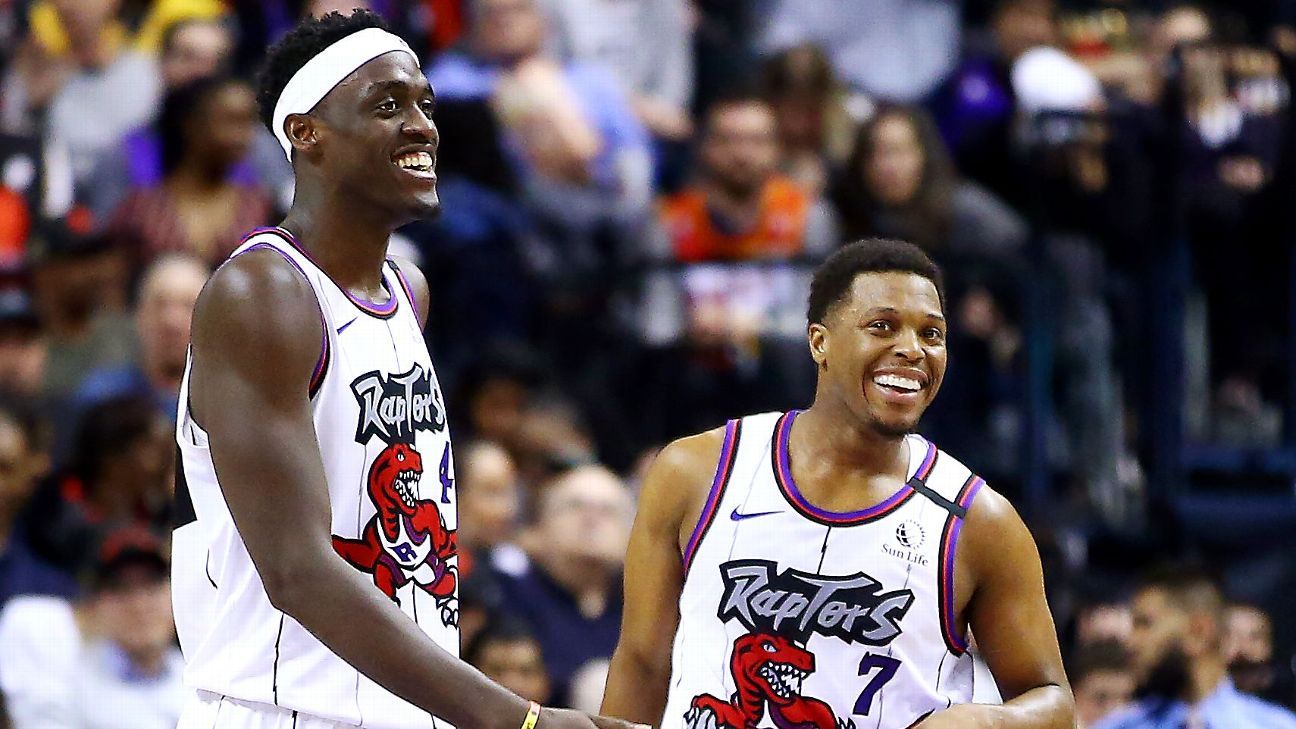
Let's go on break with 10 NBA things:
1. The mental dexterity of the defending champion Toronto Raptors
Toronto's 15-game winning streak is over, but man, is this team a joy. The Raptors bring a combination of toughness, intelligence, and confidence that is really hard to find.
Some of that was within them before they went all the way last season. But maybe winning a title cements it inside you, makes it permanent -- part of your bloodstream. You know what it takes -- how hard it is, how dialed in you have to be every second of every possession -- and that you and everyone with your shared experience can summon that. Imagine how powerful that knowledge is? Even guys who played no role on last season's team -- Chris Boucher, Terence Davis, Rondae Hollis-Jefferson, Matt Thomas -- seem imbued with it.
They fly around on defense with a perfectly calibrated controlled frenzy -- long and roaring fast, but never out of control. They make reads on the fly, and rarely screw up:
What Pascal Siakam and OG Anunoby pull there -- a jump switch in the left corner -- looks easy, but it's not. Toronto can make four or five reads like that in a 10-second span without screwing up -- a rare thing.
Nick Nurse knows how smart his team is, and tests his players with complex defenses: zones, box-and-ones, triangle-and-twos. For short stretches, he randomizes matchups in ways that would appear unfavorable to Toronto: Anunoby jostles with a center -- Domantas Sabonis and Karl-Anthony Towns recently -- while one Toronto big roams elsewhere. Sometimes, it backfires. But sometimes, it confuses the offense or lures it into inefficient one-on-one battles.
On offense, Toronto rushes the ball up with something like glee. In the half court, they are all cuts and extra passes and instant decisions:
It appears as if no one cares about individual numbers. Siakam and Kyle Lowry are both scoring more, but they know they need to fill the void left by Kawhi Leonard.
Toronto isn't the most talented team in the East. The Raptors might be getting a little lucky with opponents missing 3s; they allow the most 3s of any team, somewhat by design. They won't have the best player in any series against Milwaukee or Philadelphia, and maybe not against Miami or Boston. But they have a will and a belief that makes them dangerous.
2. It's time for Minnesota's tentpole duo to bring it on defense
Great offense can take you far. You can have fun, win 50 games, get on TV. But without a good defense, you are never going anywhere serious.
Towns and D'Angelo Russell have each other. Now it's time for them to get serious about the grimier aspects of basketball.
Russell has too often been a traffic cone and magnet for screens. It will never be easy for him to defend point guards. He's not the most explosive dude. But he can give better effort -- snap into a defensive stance, get skinny around screens.
Towns has been all over the map. He has had extended stretches of average defense, fits of legitimate effectiveness, and long fallow periods. He can appear strangely leaden considering how he glides on offense. His effort and timing come and go. He can still get overeager chasing blocks, exposing the glass.
In some seasons -- this one included -- he has been a drag on Minnesota's transition defense. In others, he has been fine.
He has been a beat late rotating to the rim a lot this season:
He ranks last among centers in ESPN's defensive real plus-minus, and 484th out of 490 players.
Then again, opponents have hit only 52% in the restricted area with Towns nearby, per NBA.com -- a stingy number. Opponents are getting to the rim and the foul line less often with Towns on the floor. Minnesota's defense has been way worse with Towns mostly because opponents have hit 41% of their 3s, and 32.7% when he rests. How much of that is on Towns? How much is luck?
Overall, Towns has been a below-average defender. But there is a decent one in here -- not a great one, but good enough to (eventually) go deep into the postseason. It's time to see that player.
3. The beauty of a simple place switch
This is one of the simplest ways to inject unpredictability into your offense:
All Russell and Juancho Hernangomez do is switch places while the defense is transfixed by Towns on the other side. That confuses Siakam and Thomas, who both assume they are responsible for the low man.
Any team can do this on dozens of possessions every game.
Some of the promise of the Russell-Towns pairing lies in plays like this. Russell has always been a sly off-ball mover, bobbing behind flares screens and popping up for open 3s. The Lakers under Luke Walton directed Russell into a sort of hybrid role heavy on such actions.
Towns is dangerous enough running the offense -- a triple threat from 25 feet out -- that Minnesota can design chunks of its system around those elements. It provides both variety and floor balance, with Towns -- their biggest defender -- in prime position to rush back on defense. It nudges Russell away from too many long 2s.
4. All-Star snub rage without context
Snub rage -- and maybe all NBA discourse -- hit its nadir when Eric Goodwin, the agent for Matisse Thybulle, released a statement lamenting that "ASSistant coaches" had blown it by not selecting Thybulle to the Poulan Weed Eater Rising Stars Challenge Presented by Sprite and Brought To You By Taco Bell and Kia The Official Car Of The NBA.
I don't disagree! Thybulle might be the best rookie wing defender I've ever seen. I would love to watch him wreck this dunk-fest.
James Jones, the Suns' GM, issued a one-line statement reacting to Devin Booker's (since rectified!) snubbing: "I have played with and against multiple All-Stars in this league and Devin Booker is undoubtedly an NBA All-Star." Case closed!
(I had Booker on my All-Star team.)
Mark Bartelstein, power agent, released a thorough statement outlining why Bradley Beal -- his client -- should make the All-Star team. Fine! Totally fair! Beal is worthy.
But if you are a respected part of the NBA -- as all these people are -- and you put out a Snub Statement, you should indicate which All-Star must be removed to make way for your client/player. Like, there aren't infinite spaces. There are 12. Not 13. Not 15. Twelve. The snubbed backers present their arguments as if they are no-brainers and everyone disagreeing with them is a moron.
They are advocating for clients. I get that. They have gone through the same thought exercise all voters have, and they know -- despite their public posture -- that these are not easy choices, even if they think their conclusion is right. If you are going to criticize the choices of others in a public forum, you should present the dilemma as what it is -- a choice where someone has to lose.
Also: It's easier to say this as a non-player, and I might be in the minority even in media, but I don't feel any huge pull to expand All-Star rosters to 15. I kinda like that we end up with painful choices -- that making the All-Star team is damn near as hard as earning All-NBA. Could we settle on 13 -- the active roster limit?
5. T.J. Warren, bringing it
Motivation is an incredible thing. The Pacers are good; the Suns, Warren's old team, were not. There are stakes now.
The Pacers have a set-in-stone culture of grinding defense, personified by Nate McMillan -- one of the greatest guard defenders ever -- and Dan Burke, their longtime defensive wizard. If you don't grind, you don't play.
And so Warren has transformed from an indifferent defender into an attentive one. He didn't make these urgent, physical, sacrifice-your-body-to-win rotations much in Phoenix:
He's averaging 3.3 deflections per 36 minutes, one of the top 40 marks among rotation players -- up from 2.4 a year ago.
He has been rugged and agile bodying guys up one-on-one. His ability to guard multiple positions has been oxygen for Indiana's smaller lineups. McMillan often has Warren guard the most threatening scorer -- wing or power forward -- allowing Indiana to hide Doug McDermott and use Justin Holiday on other assignments.
The Pacers' defense has been solid with Warren on the floor. He rates well by ESPN's advanced plus-minus statistic. He still doesn't rebound enough, and rebounding remains a huge problem for the Pacers when Sabonis rests; the Pacers snare only 68.8% of opposing misses without their new All-Star, a mark that would rank last among teams by a mile.
But Warren is doing his job, and that is all anyone asked.
6. The blossoming all-around game of Josh Hart
Zion Williamson is even better than advertised. His mind moves as fast as his body, and that is scary. He is already a good passer and cutter. New Orleans is a team-best plus-74 in 274 minutes with Williamson on the floor. Ridiculous.
But don't forget about the support players helping power New Orleans' 6-3 surge into San Antonio/Portland territory (way) behind Memphis for the No. 8 spot in the West. In particular: Hart is averaging 10 points and seven boards over his past 20 games, shooting well from deep, guarding almost every position, and flashing new passing acumen.
Hart is averaging three dimes per game in February. That might not sound like much, but it's a decent number considering Hart is a spot-up guy surrounded by drive-and-kick threats. He has been more decisive blowing by defenders rushing to close out on him, and smarter anticipating how defenses rotate.
More often now, Hart will throw the pass one link further down the chain than the defense expects. That is the difference between a contested shot and an open one.
Every team needs someone like Hart.
7. Nemanja Bjelica, filling gaps
The Kings are a mess. The Kings are always a mess. We have always been at war with Eastasia.
One bright spot: the play of Bjelica, Sacramento's overlooked free-agent coup, on fire from deep (45% on 3s!) and filling time at center amid Sacto's usual litany of injuries.
The Kings have outscored opponents by almost 10 points per 100 possessions with Bjelica as a small-ball center, mostly on the back of an offense scoring at a rate that would lead all teams, per Cleaning The Glass. Most opposing centers can't stick with Bjelica on pick-and-pops. When slow-footed bigs close out on him in a panic, Bjelica dusts them:
He's a crafty finisher and passer, dishing assists at a career-best rate.
Bjelica-at-center lineups might not hold up over the long haul. They sometimes struggle on the glass. In the playoffs -- imagining an alternate reality in which Sacramento participates in them again -- good teams with the right personnel would downsize along with the Kings, and outgun them.
But it has worked in the regular season. The Kings needed something to fill the void after injuries to Marvin Bagley III and Richaun Holmes -- who had been killing it as their starter -- and whatever the hell happened with Dewayne Dedmon. Credit Bjelica for stepping up.
8. Avery Bradley, cutting menace
Bradley was perhaps the least sexy choice as the Lakers' fifth starter, but he has meshed well on both ends. He's hitting 3s -- 37% -- prerequisite No. 1 for any perimeter guy playing alongside LeBron. Bradley has always been best as an on-ball defender, and faces too much of a size advantage against starter-level wings; having him hound point guards is a perfect use of his skill set.
Bradley's best contribution to L.A.'s starting five might be his cutting. LeBron finds him on two or three backdoor cuts every game. But more than that, Bradley uses his cuts to create looks for teammates:
Lonzo Ball ditches Bradley to double Anthony Davis. That leaves JJ Redick guarding two players on the right wing: Bradley and Danny Green. Redick stands between them. Bradley sees that, and cuts. That is a scoring cut, sure; if Redick doesn't move, Bradley darts free to the rim.
But Redick is a smart defender. He's going to react. Bradley knows that -- knows his cut will drag Redick two steps farther from Green, generating an open triple.
Bradley will cut at weird times, and into traffic -- shifts the defense might not expect:
That is a wonderful bit of improvisation. You generally shouldn't clutter the paint like that. But the Lakers' spacing is already out of whack, with Green crowding Bradley in the left corner, and Bradley understands a baseline sneak might bend the defense -- and poof, another open corner 3 for Green.
LeBron can make up for a lot of messy spacing, anyway.
9. Terry Rozier's missing playmaking
Devonte' Graham's emergence has been a godsend for the Charlotte Hornets, and also thrown into stark relief the limitations of Rozier's game. Rozier is simply not the engine of a good NBA offense. That's OK! Lots of good players aren't.
Graham's development into a snazzy playmaker has transformed Rozier into more of an secondary ballhandling wing, and he's doing well in that role: 18 points per game, and a career-best 38.5% from deep -- including a scorching 46.6% on catch-and-shoot 3s, sixth among rotation players jacking at least two per game.
He's a solid defender across multiple positions.
That is just not what Charlotte paid Rozier almost $19 million per season to do. The Hornets have to ask themselves now whether the Graham-Rozier backcourt is their long-term foundation. Graham is a liability on defense, and Rozier -- while decent and feisty as all hell -- is still only 6-1 guarding wings. Charlotte has allowed 112 points per 100 possessions with both on the floor, equivalent to the league's 25th-ranked defense.
Its offense has cratered when Rozier plays without Graham: 94.7 points per 100 possessions, nine points worse than Golden State's 30th-ranked offense.
Rozier doesn't download the floor fast enough. Passing windows close before he can exploit them. He pauses mid-dribble when zipping another bounce or two would unlock a profitable passing lane. He takes some puzzling shots with lots of time left to probe:
He doesn't operate like someone with confidence in his vision and his ability to thread passes. I bet there are some passes Rozier sees on time, and could make on time, if he risked it.
Again: There is nothing really wrong with this. There are a few dozen players in the world with above-average NBA point guard vision. But the Hornets face some tough questions.
10. Deandre Ayton has one Jokic pass
It will always be tempting to define Ayton by what he is not, which is to say Luka Doncic. He has elements of a brutish, old-school center -- a player type going out of style unless said player brings All-Defensive-level play on that end.
Ayton does not bring that, and probably never will. But he has made major strides since his first couple of months in the league, when he wobbled around like a giraffe trying to extricate itself from mud. Opponents are shooting 55% at the rim with Ayton nearby, a solid number, and a huge improvement from last season's unsightly figure -- 65%. There are fewer fatal blips of awkward footwork.
Ayton on offense doesn't fit any of the neat prototypes for the modern center. He doesn't shoot 3s. He is not an elite passer. He doesn't rim-run on the pick-and-roll as much as he should, though he is doing so more lately. His pet move appears to be a fading turnaround, which is a bad shot and a big reason Ayton gets to the line at a rate that is frankly unacceptable for someone so large -- and who snatches so many offensive rebounds. (Ayton's hands are incredible.)
Maybe Ayton isn't meant to fit any of those templates. Maybe he can fulfill his potential -- become an All-Star -- by getting B-level good at all of them, and shape-shifting between them as matchups dictate.
Case in point: He's a good passer already, and not just from a standstill at the elbows. This one caught my attention:
That is a patented Nikola Jokic pass -- a pick-and-roll turned into a give-and-go. It hides in plain sight for screen-setters, but most don't see it or have the confidence to try it. That Ayton does is a great sign.
He is one of the half-dozen or so players I'm most excited to track over these last 25-plus games.
By the way: The Ricky Rubio-Devin Booker-Kelly Oubre Jr.-Mikal Bridges-Ayton lineup is plus-56 in 180 minutes, and pouring in points -- another thing to monitor.
Indians' Clevinger to have surgery on left knee
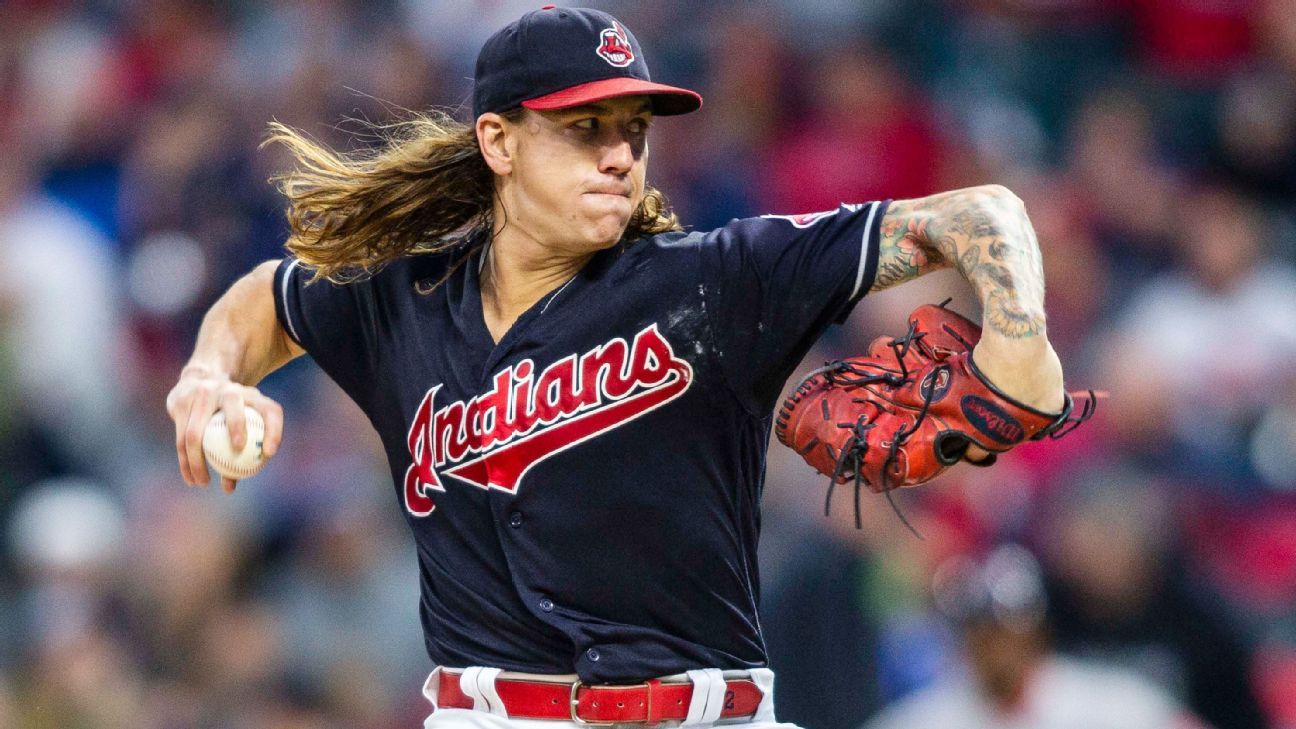
Cleveland Indians pitcher Mike Clevinger will have surgery on his left knee for a partially torn meniscus, the team announced Friday.
The right-hander suffered the injury Thursday while training at the team's spring facility in Goodyear, Arizona.
The team has not announced a time frame for his return.
Clevinger avoided arbitration this offseason after reaching a $4.1 million deal with the Indians. The right-hander went 13-4 with a 2.71 ERA in 21 starts and is being counted on to be a key part of the rotation after the Indians traded two-time Cy Young Award winner Corey Kluber.
The Indians on Friday also signed free agent Domingo Santana. The outfielder, who made $19.5 million last season, had a promising start to 2019 before injuries started to limit his playing time. He appeared in 121 games and hit .253 with 21 homers and 69 RBIs. But following the All-Star break, Santana appeared in just 31 games and hit .128.
Adam Clarke and Anna Emilie Møller lead fast times in Armagh

Northern Ireland venue once again proves perfect setting for 5km and 3km PBs
Adam Clarke won the men’s 5km at the Armagh road races on Thursday night in 13:42 as he led 21 men inside 14 minutes.
A chilly night in Northern Ireland did not stop runners posting fast times en masse as an incredible 140 men went inside 15 minutes and 227 broke the 16-minute barrier.
Clarke beat Jonny Davies by two seconds with Phil Sesemann a close third followed by Jake Shelley, Phil Norman, Matt Bergin, Krystian Zalewski, Jamie Crowe and Chris Parr behind.
Anna Emilie Møller (below) took the women’s 3km in 8:58 followed by Alex Bell – the 800m runner showing good endurance to finish runner-up eight seconds behind – and then Amy Griffiths, Kate Avery, Bronwen Owen and Steph Pennycook as 52 women broke the 10-minute barrier.
Møller, the steeplechase specialist who runs for Denmark but is based at St Mary’s in London, broke the 8:59 course record which was held by Steph Twell and Laura Weightman, while Clarke broke Topi Raitanen’s men’s course record by one second.
Both winners have been in fine form lately. Møller won the BUCS cross-country title in Edinburgh recently whereas Clarke breezed around the Dulwich parkrun course in 14:00 in November before a training camp in Australia over Christmas before returning to the UK to clock 7:59.42 for 3000m in Cardiff.
The event, which is organised by Armagh AC and supported by Brooks, has become an annual pilgrimage for runners looking for quick 5km and 3km times but this year was the best event yet. Last year a record 113 runners broke the 15-minute mark in the men’s 5km and 49 women ran sub-10 minutes over 3km but those figures were beaten this week.
Buried in the field, Shane Healy set an impressive world M50 record of 14:58.
2020 ITTF Challenge Plus Portugal Open: Day One

Monteiro sees off Takahashi
Romania’s Daniela Dodean Monteiro was in a sparkling touch today as she took care of Bruna Takahashi in stunning form, seeing off the Brazilian 4-2 (6-11, 11-4, 11-4, 10-12, 11-4, 11-4).
Monteiro’s compatriot Arina Singeorzan was sadly not as fortunate on the day, as she found herself losing out to Netherlands’ Britt Eerland 4-1 (11-7, 11-5, 8-11, 11-8, 11-4).
Lisa exits, so does Wang
Belgium’s Lung Lisa suffered a straight games defeat to Romanian Adina Diaconu, who was very efficient in her 3-0 (11-7, 11-8, 11-9) win which takes her to the semi-finals.
Over at table 5 of the Casal Vistoso, USA’s Amy Wang was unable to make her lead count as she lost out to Belarus’ Daria Trigolos 3-1 (7-11, 11-5, 11-9, 11-5).
Brave effort needed as Pistej/Balazova come through
Slovakians Lubomir Pistej with Barbora Balazova needed a strong effort on their part to come back from 1-2 down and win against Belgian’s Laurens Devos with Lung Lisa.
In a match lasting 33 minutes, Pistej and Balazova finally won 3-2 (11-6, 12-14, 6-11, 15-13, 11-5) with a brave and determined workrate around the table.
Good start for Yuan/Lebesson
It’s a good start to the day for Yuan Jia Nan with Emmanuel Lebesson as they coasted to a win against Belarus’ Aliaksandr Khanin with Daria Trigolos (11-5, 11-5, 11-6).
Similarly for Brazil’s Vitor Ishy with Bruna Takahashi, it was strong opening win over Chilean duo Juan Lamadrid with Paulina Vega (11-3, 11-9, 6-11, 11-7).
Ready to Challenge?
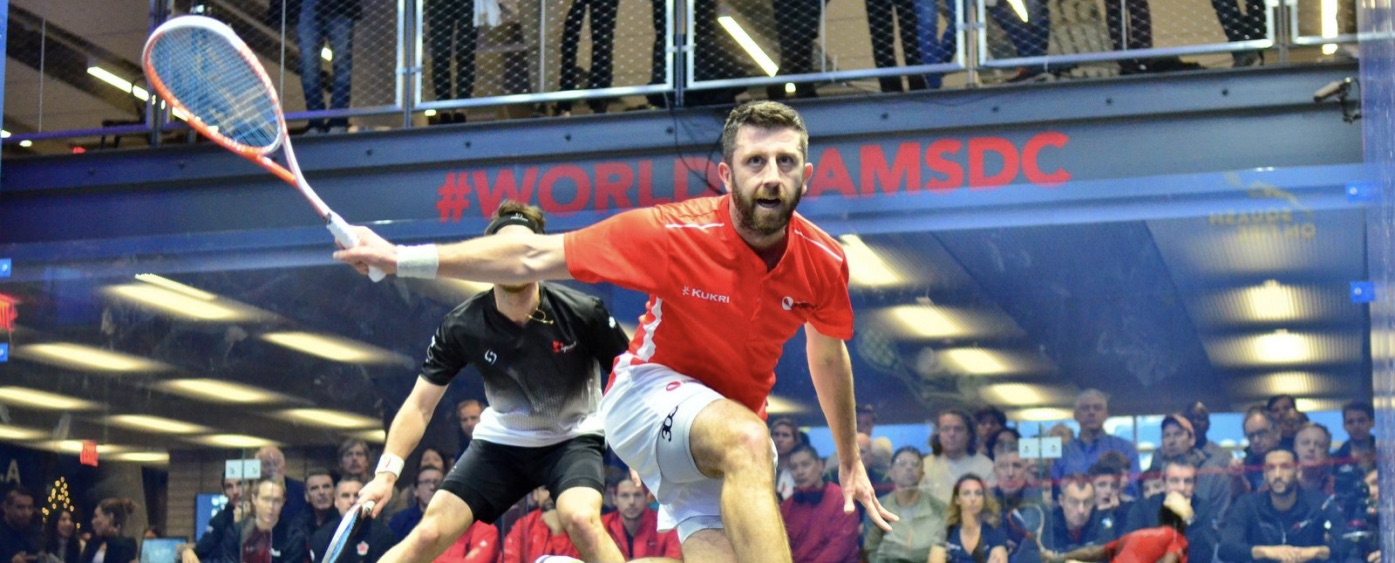
Daryl Selby in action for England (stock picture)
Ollie Pett punished after mishit strikes opponent
By ALAN THATCHER – Squash Mad Editor
Daryl Selby was awarded a walkover into the quarter-finals of the AJ Bell British Nationals after suffering an accidental eye injury in his match against Ollie Pett.
With just three points on the board in the opening game at Nottingham Squash Club (2-1 to Pett), Selby is understood to have hit a shot down the middle of the court.
Pett responded by swinging his racket behind his back only for the ball to skid off at pace and strike Selby’s right eye.
The England captain was taken to hospital and later confirmed to friends that he was relieved to learn that his retina was intact.
While Selby was receiving medical attention, he was awarded the match because the injury was deemed to have been caused by his opponent. Selby is understood to have asked organisers to award the match to Pett.
There was no confirmation this morning whether Selby would be able to play today in his quarter-final tie against George Parker on the glass court at the University of Nottingham.
In the first upset of the day, Parker took nearly an hour to stun Scotland’s Greg Lobban 3-2 (6-11, 11-6, 11-4, 1-11, 11-8).
Then in the evening session, England’s Richie Fallows got the better of compatriot and 5/8 seed Tom Richards 3-0: 12-10, 11-6, 11-3 in 42 minutes.
His prize is a last-eight clash with World No.20 Adrian Waller, a 3-0 victor over fellow Englishman Nathan Lake.
Men’s top seed Joel Makin – the sole Welsh player in either draw after defending women’s champion Tesni Evans withdrew – brought his savvy best to the court as he overcame a third game scare to beat 16-year-old English talent Sam Todd 3-1: 11-4, 11-8, 9-11, 11-2.
“Sam was attacking freely and hitting some good winners, so I’m happy to get through that one,” said Makin, the World No.11.
“If I play like I can, I should get through the rounds, so I don’t really think about being top seed.”
Makin’s Friday opponent will be Scottish 5/8 seed Alan Clyne, who kept his country’s flag flying with a comfortable 3-0 defeat of qualifier Nick Wall.
Women’s top seed Sarah-Jane Perry Perry made light work of qualifier Kiera Marshall – who was making her Nationals debut – racing to a straight games victory in just 19 minutes.
“I knew she’d be nervous, I remember my first Nationals,” said Perry after her 11-4, 11-3, 11-3 victory.
“She played well, but I haven’t played on this court and we have a tough schedule coming up so I need to get as sharp and as efficient as possible.”
Second seed and four-time champion Alison Waters survived a second-game blip against qualifier Lily Taylor to win 3-1 (11-1, 9-11, 11-4, 11-4) while men’s second seed, defending champion James Willstrop, set up a quarter-final with World No.21 Declan James after his 3-0 defeat of qualifier Charlie Lee.
“I felt good on there, I may need to step it up against the big guns but I’m pleased to be winning and healthy,” said Willstrop, a three-time British National champion.
Nottingham 5/8 seed Declan James raced out the blocks against Patrick Rooney but had to face two opening game balls en route to a 3-0 triumph (13-11, 11-8, 11-5).
Women’s 5/8 seed Julianne Courtice survived a gripping first encounter of the day against fellow Englishwoman Rachael Chadwick 3-1 (12-10, 11-9, 11-13, 11-7) to face Perry on Friday.
In the first match of the evening session – another all-English duel – [5/8] Jasmine Hutton lost the second game to qualifier Alice Green but prevailed 3-1 (11-8, 9-11, 11-9, 11-6) to set up a battle with Waters.
Elsewhere [3/4] Millie Tomlinson saw off Kace Bartley 11-6, 11-4, 11-8 in 28 minutes to set up a quarter-final clash with [5/8] Lucy Turmel, who beat qualifier Alicia Mead 3-0, while [3/4] Victoria Lust was a late 3-1 winner over Scotland’s Alison Thomson to next face [5/8] Emily Whitlock, a 3-0 victor over Anna Kimberley.
AJ Bell British National Championship 2020, David Ross Sports Village, Nottingham, England.
Men’s Quarter-finals:
[1] Joel Makin (WAL) v [5/8] Alan Clyne (SCO)
[3/4] Adrian Waller (ENG) v Richie Fallows (ENG)
[3/4] Daryl Selby (ENG) v George Parker (ENG)
[2] James Willstrop (ENG) v [5/8] Declan James (ENG)
Men’s First round:
[1] Joel Makin (WAL) bt [Q] Sam Todd (ENG) 11-4, 11-8, 9-11, 11-2 (41m)
[5/8] Alan Clyne (SCO) bt [Q] Nick Wall (ENG) 11-5, 11-7, 11-4 (33m)
Richie Fallows (ENG) bt [5/8] Tom Richards (ENG) 12-10, 11-6, 11-3 (42m)
[3/4] Adrian Waller (ENG) bt Nathan Lake (ENG) 11-6, 11-7, 13-11 (41m)
[3/4] Daryl Selby (ENG) bt [Q] Oliver Pett (ENG) 1-2 ret.
George Parker (ENG) bt [5/8] Greg Lobban (SCO) 6-11, 11-6, 11-4, 1-11, 11-8 (58m)
[5/8] Declan James (ENG) bt Patrick Rooney (ENG) 13-11, 11-8, 11-5 (40m)
[2] James Willstrop (ENG) bt [Q] Charlie Lee (ENG) 11-4, 11-8, 11-5 (26m)
Women’s Quarter-Finals:
[1] Sarah-Jane Perry (ENG) v [5/8] Julianne Courtice (ENG)
[3/4] Millie Tomlinson (ENG) v [5/8] Lucy Turmel (ENG)
[3/4] Victoria Lust (ENG) v [5/8] Emily Whitlock (ENG)
[2] Alison Waters (ENG) v [5/8] Jasmine Hutton (ENG)
Women’s First round:
[1] Sarah-Jane Perry (ENG) bt [Q] Kiera Marshall (ENG) 11-4, 11-3, 11-3 (19m)
[5/8] Julianne Courtice (ENG) bt Rachael Chadwick (ENG) 12-10, 11-9, 11-13, 11-7 (42m)
[5/8] Lucy Turmel (ENG) bt [Q] Alicia Mead (ENG) 14-12, 11-6, 11-7 (34m)
[3/4] Millie Tomlinson (ENG) bt Kace Bartley (ENG) 11-6, 11-4, 11-8 (28m)
[3/4] Victoria Lust (ENG) bt Alison Thomson (SCO) 11-5, 8-11, 11-5, 11-7 (35m)
[5/8] Emily Whitlock (ENG) bt Anna Kimberley (ENG) 11-6, 11-7, 11-2 (30m)
[5/8] Jasmine Hutton (ENG) bt [Q] Alice Green (ENG) 11-8, 9-11, 11-9, 11-6 (33m)
[2] Alison Waters (ENG) bt [Q] Lily Taylor (ENG) 11-1, 9-11, 11-4, 11-4 (27m)
For full results see www.squashinfo.com
Pictures courtesy of England Squash
Grasshopper Cup grows with world’s top women heading to Zurich
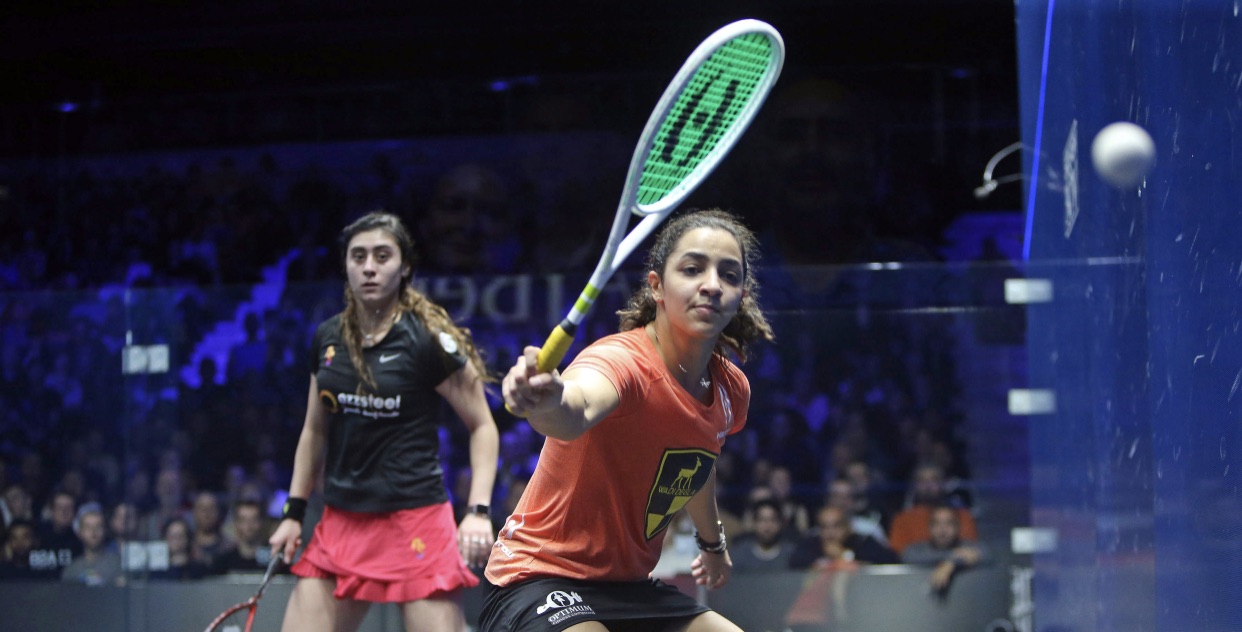
Raneem El Welily (front) in action against Nour El Sherbini
Raneem and Mo top the Swiss roll call
By SEAN REUTHE – Squash Mad Correspondent
World No.1s Raneem El Welily and Mohamed ElShorbagy will headline the draws for the 2020 Grasshopper Cup which takes place at Zurich’s Halle 622 between March 17-22.
A women’s PSA World Tour Bronze tournament will be held for the first time in the event’s history, with World Champion Nour El Sherbini joining El Welily at the head of the seedings in a top-class draw.
The duo are seeded to meet in the final in what would be a repeat of the 2019-20 PSA Women’s World Championship final held in front of the Great Pyramid of Giza three months ago. To get that far, El Welily will have to get the better of either Rachael Chadwick or Donna Lobban in the second round, before potential clashes with World No.14 Alison Waters and World No.9 Tesni Evans if she is to reach the final.
El Sherbini will have to overcome either Malaysia’s Sivasangari Subramaniam or Latvian Ineta Mackevica in the second round. She is then seeded to face USA No.2 Olivia Blatchford Clyne and England’s Sarah-Jane Perry en route to the final in Zurich.
Reigning champion ElShorbagy leads the way in the men’s PSA World Tour Gold event, with all but one of the world’s top 10 battling it out for the crown. ElShorbagy reclaimed the World No.1 spot from Ali Farag in the February World Rankings and the pair are seeded to meet in the final in the latest chapter of their enthralling rivalry.
To get there, ElShorbagy will first face either compatriot Zahed Salem or Germany’s Raphael Kandra in the second round, ahead of potential clashes with World No.9 Mohamed Abouleghar and World Champion Tarek Momen.
Top two men’s seeds Mohamed ElShorbagy (left) and Ali Farag
Meanwhile, Farag will start his campaign against either compatriot Mazen Hesham or Frenchman Mathieu Castagnet. He could then play World Championship runner-up Paul Coll in the quarter finals, before a potential meeting with fellow Egyptian Karim Abdel Gawad in the last four.
Both draws feature two Swiss players, with Nicolas Mueller leading home hopes in the men’s draw. He will face Egypt’s Omar Mosaad in the first round, while wildcard Dimitri Steinmann faces the in-form World No.19 Mostafa Asal.
In the women’s draw, both Cindy Merlo and Ambre Allinckx are wildcards for the tournament in Zurich, with the latter facing Belgium’s Tinne Gilis in the first round. Merlo will play the older of the Belgian sisters on the opening day, facing Nele in the first round.
First round action will be staged at the Uster Squash Arena, with action from the glass court streamed live on SquashTV (Rest of World), Eurosport Player (Europe only) and the official Facebook page of the PSA World Tour (excluding Europe and Japan).
Play will move to Halle 622 from round two onwards and will be streamed through the above channels.
2020 Grasshopper Cup, Uster Squash Arena and Halle 622, Zurich, Switzerland, March 17-22.
Men’s First Round Draw:
[1] Mohamed ElShorbagy – [Bye]
Raphael Kandra (GER) v [9/16] Zahed Salem (EGY)
[9/16] Omar Mosaad (EGY) v Nicolas Mueller (SUI)
[8] Mohamed Abouelghar (EGY) – [Bye]
[6] Simon Rösner (GER) – [Bye]
Daryl Selby (ENG) v [9/16] James Willstrop (ENG)
[9/16] Gregory Gaultier (FRA) v Declan James (ENG)
[3] Tarek Momen (EGY) – [Bye]
[4] Karim Abdel Gawad (EGY) – [Bye]
Campbell Grayson (NZL) v [9/16] Gregoire Marche (FRA)
[9/16] Miguel Rodriguez (COL) v Adrian Waller (ENG)
[7] Marwan ElShorbagy (EGY) – [Bye]
[5] Paul Coll (NZL) – [Bye]
[WC] Dimitri Steinmann (SUI) v [9/16] Mostafa Asal (EGY)
[9/16] Mazen Hesham (EGY) v Mathieu Castagnet (FRA)
[2] Ali Farag (EGY) – [Bye]
Women’s First Round Draw:
[1] Raneem El Welily (EGY) – [Bye]
Rachael Chadwick (ENG) v [9/16] Donna Lobban (AUS)
[9/16] Mayar Hany (EGY) v Liu Tsz-Ling (HKG)
[6] Alison Waters (ENG) – [Bye]
[5] Salma Hany (EGY) – [Bye]
Anna Serme (CZE) v [9/16] Hollie Naughton (CAN)
[9/16] Tinne Gilis (BEL) v [WC] Ambre Allinckx (SUI)
[4] Tesni Evans (WAL) – [Bye]
[3] Sarah-Jane Perry (ENG) – [Bye]
Emilia Soini (FIN) v [9/16] Emily Whitlock (ENG)
[9/16] Millie Tomlinson (ENG) v Rachel Arnold (MAS)
[7] Yathreb Adel (EGY) – [Bye]
[8] Olivia Blatchford Clyne (USA) – [Bye]
[WC] Cindy Merlo (SUI) v [9/16] Nele Gilis (BEL)
[9/16] Sivasangari Subramaniam (MAS) v Ineta Mackevica (LAT)
[2] Nour El Sherbini (EGY) – [Bye]
Pictures courtesy of PSA




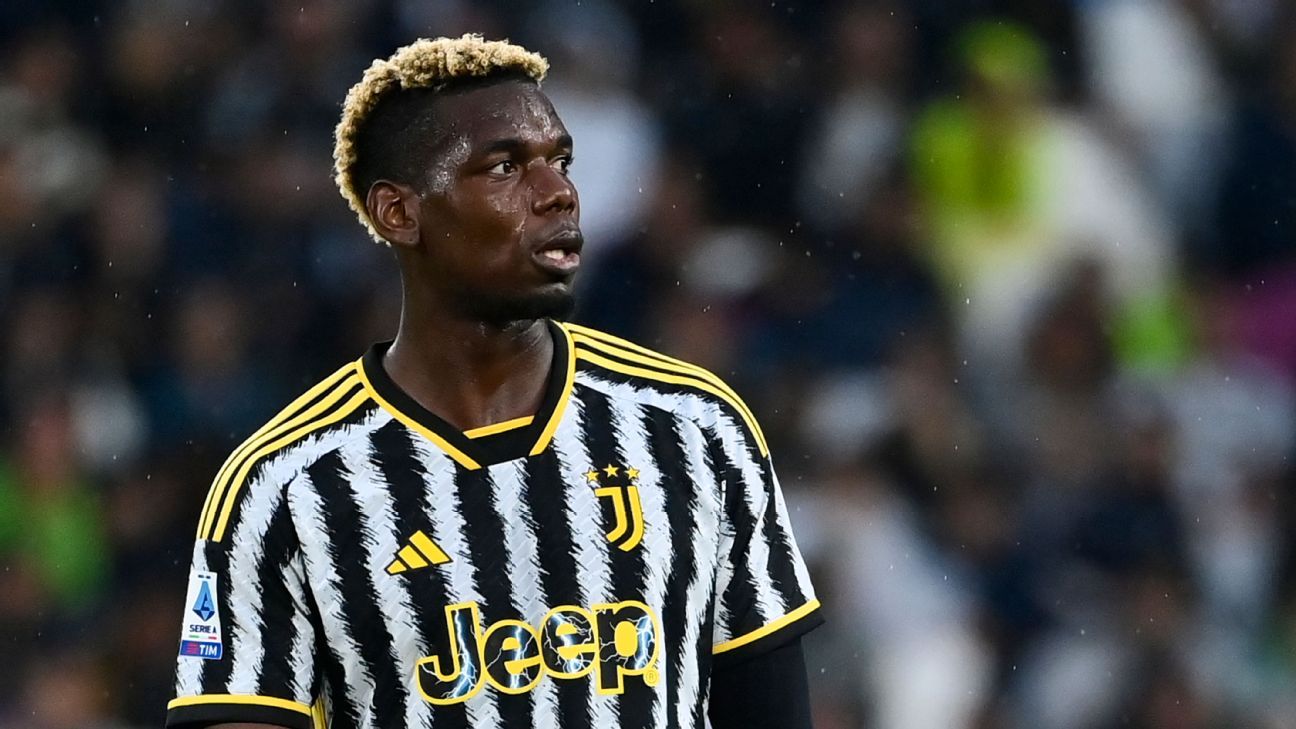





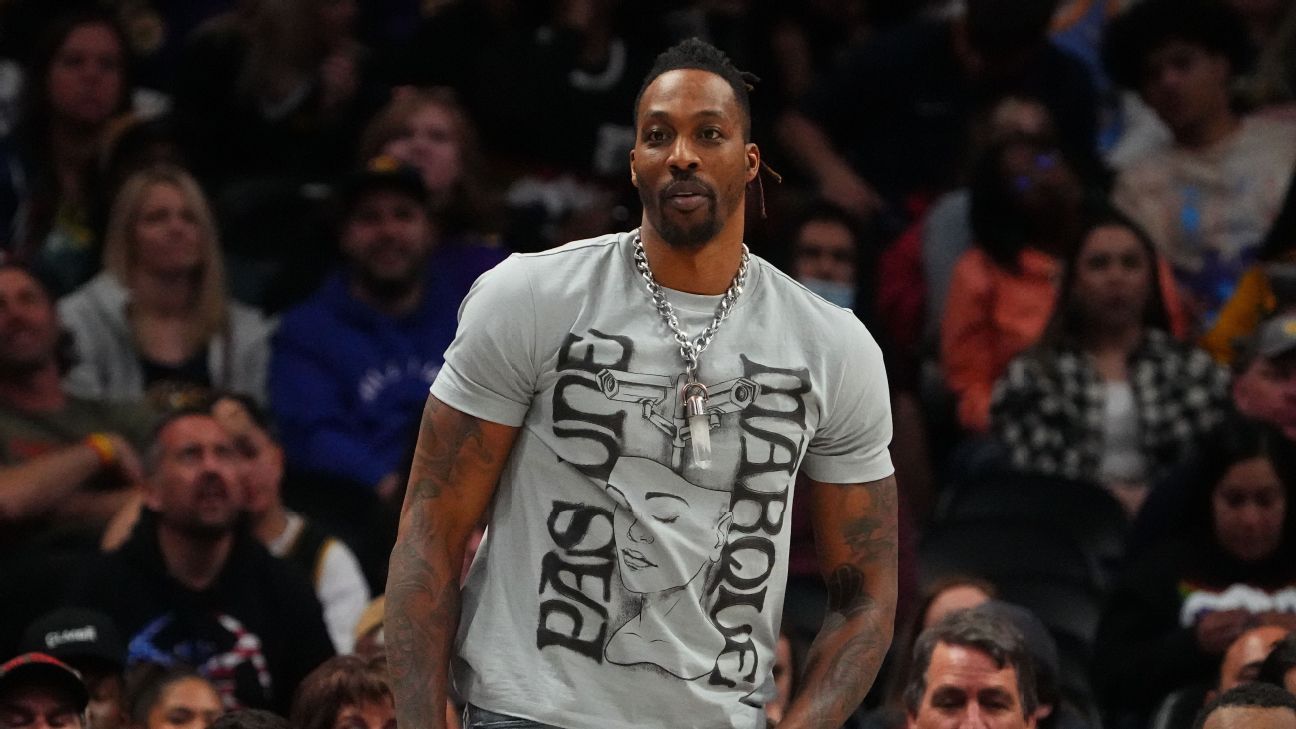

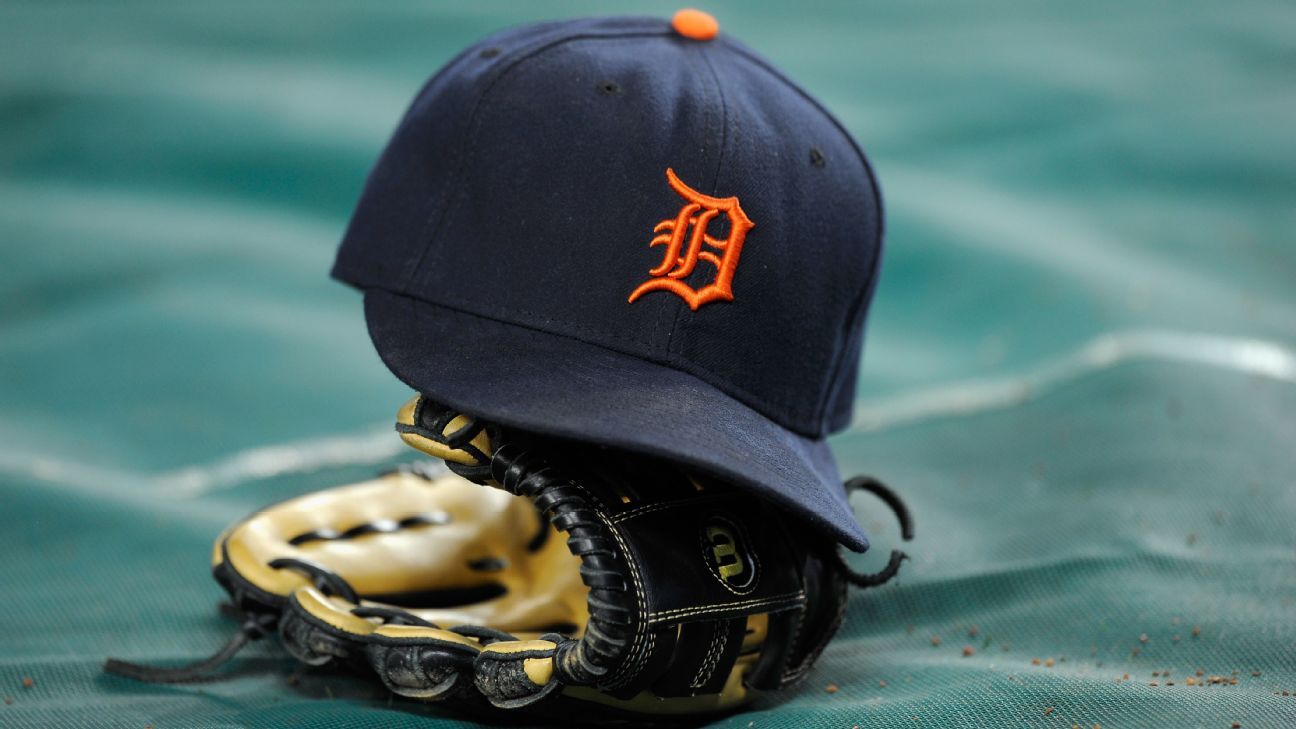


 Phone: (800) 737. 6040
Phone: (800) 737. 6040 Fax: (800) 825 5558
Fax: (800) 825 5558 Website:
Website:  Email:
Email: 






